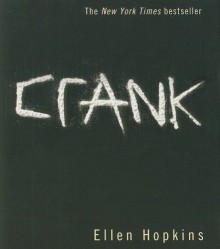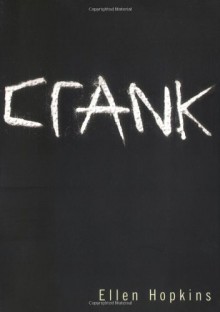
Initial reaction: I'll have to think about how I'm going to write the review for this book, but it'll be a sizable one.
I have a hard time saying that this book was a favorite of mine - because the topic it chose to cover - on multiple levels - isn't one that's easy to read or anything that I could say you could "love" per se. This book is like watching a car crash you can't stop until it's too late to reverse, no matter how much you want to yell at the driver "For the love of all that's holy, please STOP." Only thing I can say was that watching Kristina's descent was heartbreaking, and probably for more than one angle of it all.
4.5 stars overall though. Laura Flanagan's reading of the audiobook was fantastic, and as difficult of a read as it was, it gave me so much to think about in the end of it all.
Full review:
"You can get addicted to a certain kind of sadness
Like resignation to the end, always the end
So when we found that we could not make sense
Well you said that we would still be friends
But I'll admit that I was glad that it was over."
- "Somebody That I Used to Know" - Gotye
Thought it was appropriate to quote these lines from this song since it was in my head as I started meditating over my thoughts about "Glass."
I'm still shaking and a bit misty eyed even in the aftermath of reading this because - watching someone fall this hard while in a seemingly endless cycle of addiction to drugs is not easy in any measure, whether in fiction or in real life. I think Ellen Hopkins captured the emotional journey rather well, on more levels than one.
"Glass", the second book in the "Crank" series, is still very much Kristina's story, though I'll admit I liked being able to have a dimensional viewpoint of how Kristina's actions/decisions affected others around her and being able to see that in the context of Kristina's voice and mental bargaining. When we last left her, she'd endured quite a bit in her addiction to the "Monster," made and broken many connections in the process, but had started coming to terms with the aftermath of events and her initial addiction in some capacity. But if the last book had something of hopeful note in certain considerations, this book completely blew that possibility out of the water with its revelation of events.
What made this journey most powerful for me was how well this novel provided several dimensional views of Kristina's psyche. On one hand - we see the irresponsible, yet insecure 17 turning 18 year old that she is - having survived several series of ordeals from "Crank" and navigating a measure where she's searching for...something. Whether it's love, acceptance, a life, a future - possibly all four. These views of her character are rare in the narrative, but they provide a really potent insight on the tug-of-war that's going on in her head as well as a humanizing of her character that's honestly rare in comparison to other narratives that would try to profit off the emotional baggage the conflict entailed.
On another, Kristina is seriously hard to follow and sympathize with because of her actions - between the increasing distance she puts between herself and her family, her irresponsibility around children (whether her own child or others, and that was one of the things that made me angry as I read this - more on that in a little bit), her addictions, her quickening temper/recklessness, and just the overarching moral descent where she'd do anything to get her next "hit" or establish her life where it's just coasting the surface for the moment - nothing permanent, mostly temporary gratification.
I said in my initial notes that reading this book was like watching a car crash where you can't do anything but watch it as it unfolds. I knew that either Kristina would have to stop herself or something/someone would stop her eventually, and the aftermath would be a bitter pill to swallow. I'm not going to spoil which route the story takes in case people want to read this series for themselves, but while I was surprised by how it reached that point, I wasn't surprised that it'd go the route it did. Too many times people who are addicted to something tell themselves they will stop only to get lost in the clutches of it, to the point where desperation takes over and they'd do anything within it.
Hopkins's prose not only weighs Kristina's perspective, but the reactions of the people who were around her - which broke my heart. I mean, watching Kristina's family endure one too many tests of patience with her was one thing - particularly with the increasing deception and upsetting justifications that Kristina employed. Her increasing distance from her baby was another difficult measure, with the precarious situations she put him in as well as other children (she ended up being a sitter to one of her guys who was dealing/using with her - those scenes were very hard to read).
While Bree's mention wasn't as frequent as the previous novel, Kristina's bold and crude alter-ego was still very front and center, taking the reins and showing the darker parts of Kristina's personality and increasing need for the more potent drugs she's come across. This book also deals with unresolved conflicts Kristina has from the previous novel in her relationships (reunion with the father of her child, etc.)
I was left with much to think about at the end of this novel - long story short. The poetic styling of this wasn't as easy for me to tell as the last book, but I thought Laura Flanagan did an excellent job on the audiobook reading, particularly with the inflections of emotion and enunciation she gave in the process. It was ultimately why I ended up liking the listening experience as much as I did.
This book touches on several tough conflicts, including drug use, rape, sexuality (incl. GLBT relationships, though it's not a prime focus of the book and I did have some issues with the character's inner voice for some assumptions there). I appreciated some of the unflinching insights in the narrative. The ending has something of a similar tone as the first book, and it does leave the possibility of another expansion on the storyline. I will say that certainly this is not a light read by any means. It hurt to watch, but I felt with the way the characterizations, interactions, and events were portrayed, it immersed me in the story and gave me so much to think about in its aftermath. Stories like this happen all the time, probably more often than people realize. Not everyone can get the help they need, the relationships that are in one's addiction are fragmented, messy, and complex, and I respect the fact that the portrayal was raw and very real.
I'm definitely looking into more of Hopkins' writing, and I did appreciate and respect the insight of this read.
Overall: 4.5/5 stars.


 Log in with Facebook
Log in with Facebook 








